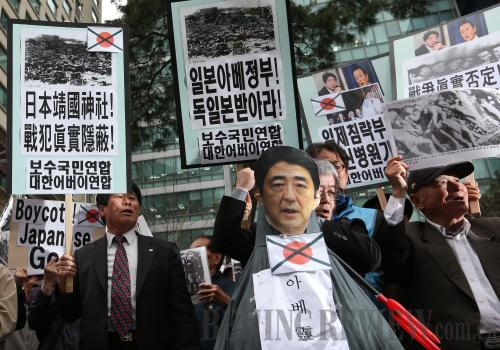|
 |
|
PEEVED PACIFISTS: People rally outside the Japanese Embassy in Seoul on April 25, decrying Japanese Prime Minister Shinzo Abe's remarks denying the country's aggressive history and Japanese lawmakers' visits to the Yasukuni Shrine (CFP) |
A nation's constitution represents its highest ideals and laws, and any attempt to change such a crucial foundation must be approached with utmost respect and foresight.
However, Japanese Prime Minister Shinzo Abe recently reaffirmed his pledge to revise his country's supreme law in such a brash manner that it drew fierce criticism from neighboring countries as well as media worldwide.
Seen from the context of the current Japanese pacifist Constitution's origins and the attitude of the Japanese Government toward that period of history, critics say that outsiders may easily understand why Abe's vows have provoked such a strong backlash.
Abe's pursuit of constitutional revision aims to erase Japan's aggressive history during World War II. Critics say, however, that to close that dark chapter of its history, the Japanese Government should face up to it through honest introspection rather than whitewash its past deeds.
Great-power dream
Abe, like other ambitious state leaders, has a dream of great power for Japan—especially at a time when the economic power's global status is continually declining. During his Washington trip in February, Abe claimed that "Japan is not, and will never be, a tier-two country" in a speech titled Japan Is Back.
Since returning to power last December, Abe has taken bold steps toward economic reform, including deregulation and joining Trans-Pacific Partnership free-trade negotiations. The so-called "Abenomics" plan has gained the prime minster high popularity in Japan. A Kyodo poll at the beginning of May showed Abe's approval rating is 71.1 percent, which Geng Xin, Deputy Director of the JCC New Japan Research Institute, said is mostly owing to Abe's economic policies.
His high domestic popularity, however, has been accompanied by strong criticism by overseas media and howls of protest from neighboring countries.
The Abe administration has taken the opportunity to undergo the beginning of a rightward shift, beautifying past Japanese war crimes and raising once again the issue of rewriting its pacifist Constitution.
Asked in parliament about his government's position on an official apology made by former Prime Minister Tomiichi Murayama for Japan's colonial rule and aggression in Asia during World War II, Abe replied, "The definition of what constitutes aggression has yet to be established in academia or in the international community. Things that happened between nations will look differently depending on which side you view them from."
Abe's move has enraged not only China and South Korea, two of the biggest victims of Japan's war crimes, but also some major Western media outlets.
An editorial in The Washington Post reads, "Yes, history is always being reinterpreted. But there are such things as facts. Japan occupied Korea. It occupied Manchuria and then the rest of China. It invaded Malaya. It committed aggression. Why, decades after Germany solidified its place in Europe by facing history honestly, are facts so difficult for some in Japan to acknowledge?"
Meanwhile, a comment of The Wall Street Journal said that Abe's "foray into historical relativism will come as news to survivors of Pearl Harbor, the Bataan Death March or the Rape of Nanjing." "Much of the world long ago forgave Japan its wartime atrocities. But it hasn't forgotten them."
On April 28, the first "Restoration of Sovereignty Day" advocated by the Abe administration in commemoration of the day in 1952 when the San Francisco Peace Treaty took effect and formally ended the U.S. occupation of Japan, Abe called for a renewal of a sense of hope and determination, "to make Japan a strong and resolute country," a clear sign of Abe's intention to revise the Japanese Constitution.
When meeting with reporters on May 1 during his overseas trip, Abe vowed to win two thirds of the seats in the upper house required for constitutional revision in the July election.
The revision, which would once again give the nation the right to self-defense, is seen by many experts as a pretext for strengthening the Japanese military.
"Japan is an economic power, but Japanese politicians have always pursued a military-political power status, expanding its political sway through the normalization of its military power, which calls for breaking the tether of the current pacifist Constitution," said Shi Yongming, an associate research fellow with the China Institute of International Studies.
The Japanese pacifist Constitution, which has served as a solid foundation for the rapid development of Japan in the postwar era, is denounced by Japan's right wing as a national shame because it was drafted by the "occupying forces."
| 